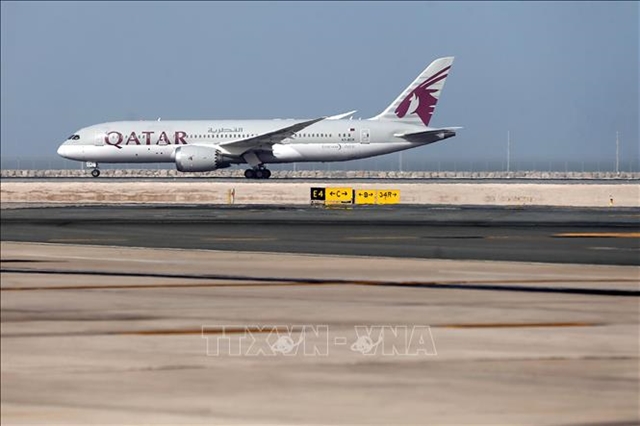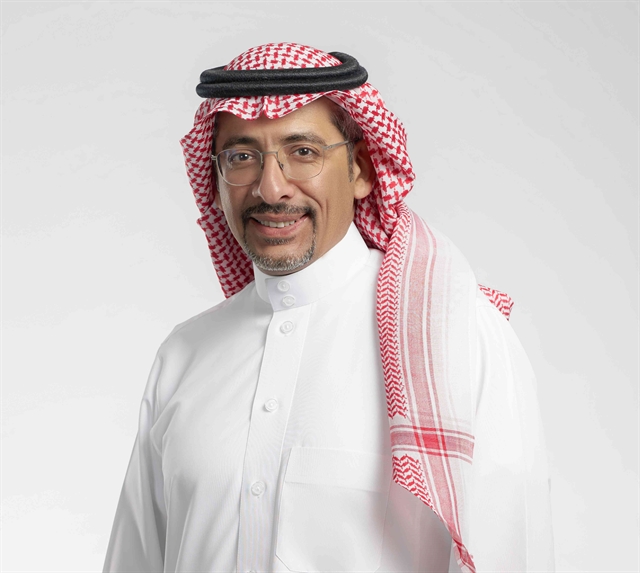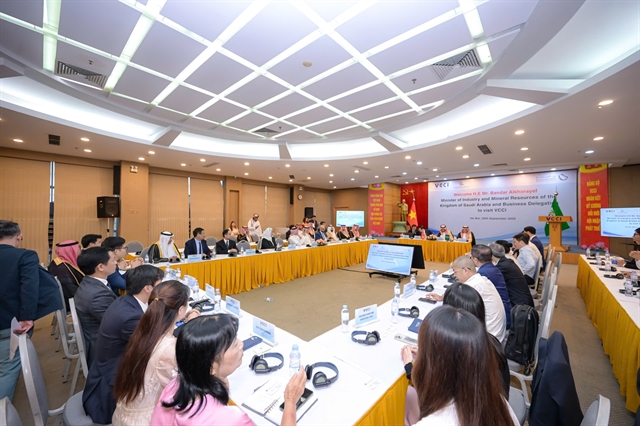 Economy
Economy


|
| The Kingdom of Saudi Arabia's Minister of Industry and Mineral Resources Bandar Bin Ibrahim AlKhorayef. — Photos courtesy of the Kingdom of Saudi Arabian Embassy in Việt Nam |
HÀ NỘI — During his visit to Việt Nam earlier this week, Saudi Arabia's Minister of Industry and Mineral Resources Bandar Bin Ibrahim AlKhorayef spoke with Việt Nam News and Law reporters about opportunities to increase cooperation and investment between the two countries.
Could you provide an overview of the current state of economic, trade and investment cooperation between Saudi Arabia and Việt Nam?
I am very happy to be here in Việt Nam representing my government of Saudi Arabia. I am also very honoured to be the minister in charge of representing Saudi Arabia in the Saudi-Việt Nam Joint Commission.
Politically, our two countries enjoy strong relations, with leaders having met several times. I had the pleasure of meeting the Prime Minister of Việt Nam when he was in Saudi and we believe that the two nations also have a good relationship. But this is not reflected in trade and investment. We believe that current trade and investment is very modest compared to the potential of the two countries, as well as the good relations which form an important foundation for the private sector to build on projects.
What are the future prospects of the cooperation between the two countries?
I think this is a very important question because when we look at the different strengths of the two countries we see many areas for collaboration.
We can see and admire what Việt Nam has done in the last 20 years in its economic growth, especially in industry and industrialisation, where today a lot of exports are being made from Việt Nam.
Saudi Arabia is also trying to diversify its economy from being oil-based into other sectors, so there is great opportunity in manufacturing, especially in food processing, renewable energy, machinery and construction equipment.
There are also opportunities in other sectors like tourism, education and technology. These to me are very important prospects.
Agriculture is also important. As you know, Saudi Arabia is not an agricultural country. We do not have a lot of water, which is why it is important to look for sources of food and food products.
Which specific sectors does Saudi Arabia hope to see strengthened trade and investment cooperation with Việt Nam?
I think the most important thing is that we see Saudi Arabia as a good place for the expansion of different companies from Việt Nam.
Việt Nam has a good presence in Asia, and for Vietnamese products to be present in Africa and the Middle East I think Saudi Arabia is key. Saudi Arabia has a good location where we can access different markets. We have many resources like oil, gas, petrochemicals and minerals, as well as good infrastructure, stable financial strength and political stability. The region is becoming more demanding for different products, especially in countries with rising needs such as Iraq, Syria, Yemen and Lebanon.

|
| On September 29, the Kingdom of Saudi Arabia’s Minister of Industry and Mineral Resources, Bandar Bin Ibrahim AlKhorayef, along with a business delegation, visited and engaged with the Vietnam Chamber of Commerce and Industry (VCCI) and held meetings with several key Vietnamese companies. Photos courtesy of the Kingdom of Saudi Arabian Embassy in Việt Nam |
What opportunities and challenges do Vietnamese businesses face in developing trade and investment with Saudi Arabia?
I think there are a lot of advantages. Today, more and more Vietnamese products are directly exported, so Vietnamese companies are very well experienced in producing goods for export.
One of the things we may need to look at is logistics. How can we improve logistics to better support industries? But I am a great believer that with more trade, logistics will naturally improve.
What should the governments of both countries do to create more favourable conditions for the development of bilateral trade and investment?
I think today what we are witnessing is that governments have a very important responsibility to create a friendly ecosystem for both investment and trade. We are talking with the Vietnamese government to support the private sector from both sides. We agreed with the Minister of Industry and Trade today that if there are any barriers or challenges for any company from Việt Nam, we will be very happy to look at them and help, and vice versa.
I think our government also makes regulations very clear to support investors in connecting with their counterparts. Our regular meetings will always examine any difficulties and challenges, so the private sector can feel confident that both governments are working hard to make their investments successful.
What are the prospects of entering the Halal market for Vietnamese enterprises?
Halal is a very important market globally, not only in Saudi Arabia, and we see increasing demand. There is a great opportunity for Vietnamese companies to explore Halal products and target Halal customers.
We would be very happy to help Vietnamese companies understand more about the requirements of the Halal market, because it is becoming more complicated and there are many areas that companies need to address.
We can work with companies from Việt Nam to help them understand the requirements, how they can comply, what is needed and how to find the right market.
Vietnamese companies need to pay close attention when providing Halal products to customers. It differs from product to product, but countries that are not familiar with the requirements sometimes think Halal is only about the product itself. For example, with pork or chicken they look only at how the animal is slaughtered, which of course is important.
But what is sometimes overlooked is the food supply chain for the animals. For fishery, for example, the Halal market requires there is no mixing with non-Halal products. These are areas that need to be clearly understood. — VNS




